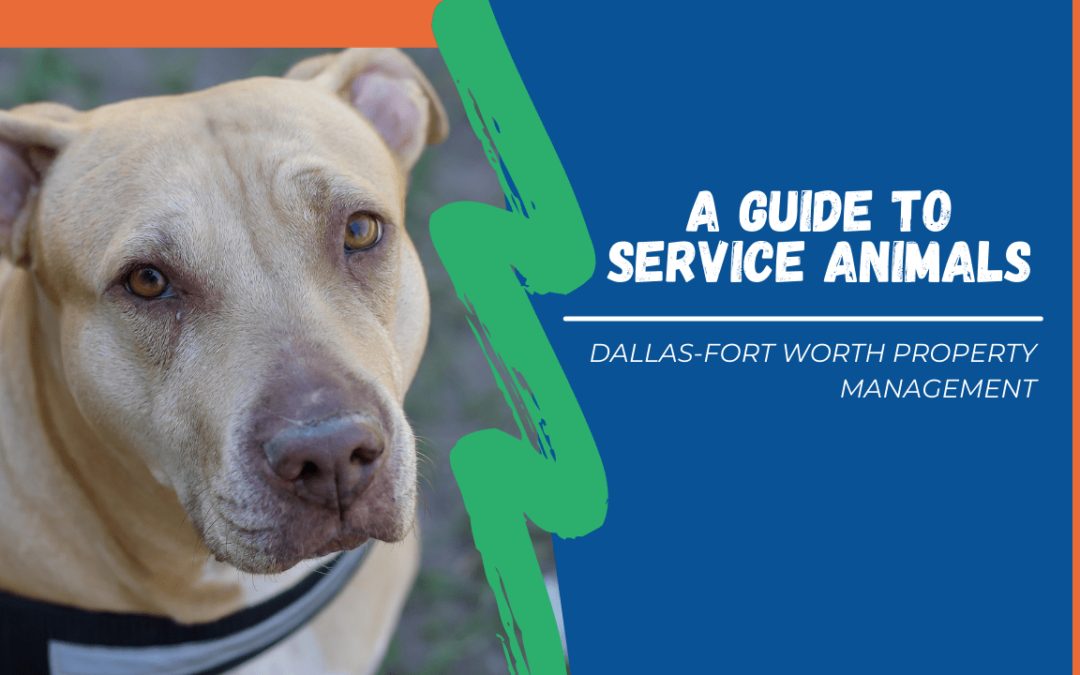Staying up to date on all the legal changes and fair housing requirements is a lot for a landlord to manage. As professional property managers in Dallas-Fort Worth (DFW), we know the state, federal, and local laws to the letter. It keeps our owners and investors out of legal trouble.
One of the areas in which it’s easy to make an expensive mistake is in fair housing. Following fair housing laws is about more than avoiding discrimination. It includes protections for tenants who need service and support animals.
Service animals are protected by several federal laws, and while most DFW rental property owners understand that they cannot deny housing to people who need service animals, they don’t always understand the details involved in those protections.
Make sure you understand the laws protecting service animals, emotional support animals, and companion animals. There are some specific things related to these animals that you can and can’t do when it comes to leasing your home, screening your tenants, and managing your property.
Pets vs. Service Animals
Many rental property owners we talk to hesitate to open their investment properties to pets. They’re worried about the damage that can be caused and the liability that often comes with dogs and cats living in the rental home.
Not allowing pets is perfectly legal. However, service and support animals are not considered pets.
The law considers these animals to be accommodations, not pets. You can think of them as similar to the wheelchair ramp you install in front of your building or the handrail you put in a shower. You cannot deny a service animal, companion animal, or emotional support animal even if you don’t allow pets in your lease.
Not only can you not deny these animals – but you also cannot charge a pet deposit or a pet fee.
If you don’t want to accept a pet into your rental property, you don’t have to. But, you are required to accept service and support animals, and you cannot deny a tenant who is otherwise qualified for your home just because he or she is moving in with a service animal.
Protecting Your Dallas-Fort Worth Rental Property

First, you are entitled to ask for the required documentation. Service animals will come with specific paperwork explaining exactly what they do. Emotional support animals are a little different. The animals are designated as providing emotional support, and instead of having paperwork, the tenant will need to provide proof of authorization from their medical doctor or healthcare provider. This will outline what the animal is needed for.
We recommend that you do your due diligence and screen the animal. Contact the doctor who signed off on the tenant’s documentation to confirm everything. It’s easy for tenants to go online and print out a generic authorization. You are legally allowed to follow up with the healthcare provider and verify that the tenant is a patient of theirs and in need of said service animal.
Tenants are responsible for their service and support animals. You cannot charge a pet deposit, but you can still charge a security deposit, and if there is damage to the property after a tenant moves out due to the animal, you can deduct the cost of repairs. You can also require your tenant to clean up after the service or support animal and keep it from being a nuisance to neighbors and other tenants in a building.
This is still a confusing area of the law for many rental property owners and landlords, and it’s always evolving. We’re here to help you stay in compliance. If you have any questions about pets, service animals, or anything about Dallas-Fort Worth property management, please don’t hesitate to contact us at Assign Property Management.


Recent Comments